Share
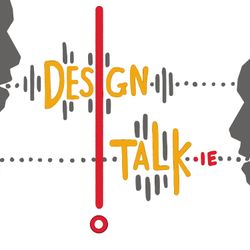
Design Talk (dot IE)
A podcast about design in-the-wild; the good, the beautiful, and the utilitarian.
Latest episode
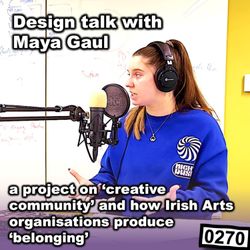
270. 0270 - Creative Community with Maya Gaul
07:38||Season 13, Ep. 270In this, our first episode on ‘research design’ and ‘research designing’ I talk with Maya Gaul and Dunk Murphy from the Creative Futures Academy at UCD. Maya is completing a BA in Creative & Cultural Industries. Her final year project combines research with performance. The subject is Creative Community; an exploration of Irish Arts organisations and how they produce ‘belonging’. Maya talked about her plan for the production - to include elements of documentary, performance and interaction culminating in an event that digs into what arts and inclusion means for practitioners and audience.Notes:The Creative Futures Academy - https://creativefuturesacademy.ieUCD’s BA Major In Creative & Cultural Industries - https://www.ucd.ie/artshumanities/newsandevents/ucdlaunchesnewbaincreativeculturalindustries/AcknowledgementsMusic Title: DeparturesArtist: PortrayalSource: https://bit.ly/2QkBzvILicense: CC BY 4.0Cover Art Title: In the Think LabArtist: Allen Higgins. Photo credits: Dunk Murphy. Used with permission.Source: MayaGaul.pptxLicense: CC BY-NC-SA 4.0Podcast LicenseDesign Talk (dot IE) CC BY-NC-SA 4.0 The license can be viewed at https://creativecommons.org/licenses/by-nc-sa/4.0By taking part, you give permission for your voice to be recorded, for the recording to be edited, and for it to be posted and published as a podcast.
More episodes
View all episodes
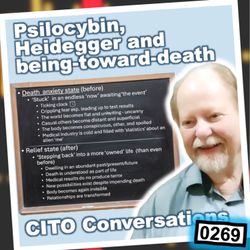
269. 0269 - Johno (Robert Johnston) on Psilocybin, Heidegger and being-toward-death
01:24:54||Season 13, Ep. 269Psilocybin, Heidegger and being-toward-deathBetween 2020 and 2023 psychologist Marg Ross and psychiatrist Justin Dwyer, together with collaborators, ran the largest Australian randomised control of psychedelic assisted psychotherapy for the treatment of extreme death anxiety in terminally ill patients using psilocybin (the active ingredient in magic mushrooms) (Ross et al, 2025). Over the past 15 months I have contributed to the analysis and reporting of qualitative interview data collected by these researchers before and after treatment. The therapy has been shown to be remarkably effective with 21 out of 28 patients who completed the full trial reporting sustained relief. Whereas before the treatment the patients had found themselves 'stuck' in an oppressive lingering present, after treatment they are able to 'step back into' a life that is in some ways fuller even than before the diagnosis (Dwyer et al, 2026). In this reading group/seminar I will briefly present Heidegger's account in Division II of Being and Time of being-toward-death and its role in prompting a more authentic human existence and richer lived temporality. I will point out its striking similarity to the change phenomenon we observed in the qualitative analysis. I invite discussion of this observation, its implications, and suggestions. Note I will devote little time to describing the clinical trial so reading the accompanying paper (Dwyer et al, 2026) is advised.JohnoRobert B. Johnston is a professor (emeritus) at University College Dublin, and a person in his own right.Dwyer, J., Johnston, R. B., O'Callaghan, C., and Ross, M. 2026. "Stepping Back into Life: How Psychedelic Assisted Psychotherapy Transforms the Way of Life of the Terminally Ill," General Hospital Psychiatry (98), pp. 86-96. doi: 10.1016/j.genhosppsych.2025.12.002AcknowledgementsMusic Title: Justice Little LeagueArtist: Ema GraceSource: https://bit.ly/2tJ6BndLicense: CC BY 4.0Artist notes: Ema Grace is an AI vocaloid produced by Ryoma MAEDA (@Ryoma_Maeda). Styled as virtual Singer&Idol 架空のバーチャルアイドル & シンガー、それがEma Grace.Cover Art Title: Inspired by zoomArtist: Allen HigginsSource: CITO-podcast-Johno.pptxLicense: CC BY-NC-SA 4.0Podcast LicenseDesign Talk (dot IE) CC BY-NC-SA 4.0 The license can be viewed at https://creativecommons.org/licenses/by-nc-sa/4.0By taking part you give permission for your voice to be recorded, for the recording to be edited, and for it to be posted and published as a podcast.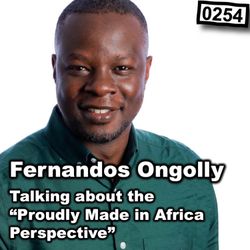
254. 0254 - The PMIA Perspective with Fernandos Ongolly
56:14||Season 13, Ep. 254Today we’re talking with Fernandos Ongolly, to learn about home-grown innovations and digital startups from The Continent – in this case, Africa. Our hosts are Selma Anya, Safa A. A. Emam, and Diana Achiro, students on the MSc Digital Innovation programme.Fernandos has a PhD from UCD. He is the current “Proudly Made in Africa” Fellow in Business and Development at UCD College of Business, and the founder of – Non-EU Academics and Researchers Community in Ireland.Our audience is the class of 2025 studying the Outsourcing and Offshoring module taught by Allen Higgins.First, Fernandos, would you like to say a few words about your current role and a little about your journey?· African nations might not be the first place that investors and business associate with “technology ambition”, can you set the context? [notes: technical infrastructure, physical infrastructure, population demographics, connectedness etc.]· Talk about some success stories from Africa and the sectors they occur in? [notes: in FinTech, Education, AgriTech and eCommerce]· What are the opportunities for outsourcing to Africa? [notes: BPO, content moderation and specialized services, much of today’s AI is/was trained by centers in Africa]· For the startup environment, like Silicon Valley, where are the incubators, clusters, and centers of excellence? [notes: the three big regions East, West and South – Kenya; Nigeria; South Africa]· Can you talk about the role culture plays. No doubt there are challenges but opportunities too? [notes: strong social ties, high-trust cultures, entrepreneurial attitude is prevalent – trading is a way of life]· Questions from the hosts· Questions from the audience.Further reading and notesFernandos Ongolly on LinkedIn - https://www.linkedin.com/in/fernandos-ongolly-phd-89927b32/Proudly Made in Africa is a Trade Justice and Global Citizenship Education organization. For more see - https://www.proudlymadeinafrica.orgAlso, the PMIA Podcast on YouTube - https://www.youtube.com/@proudlymadeinafricaAcknowledgementsMusic Title: Faceplant with UK GarageArtist: Allen HigginsSource: a-Wed23Oct2024License: CC BY-NC-SA 4.0. Includes samples from Ableton Live by Ableton AG and by KORG Inc.Cover Art Title: Guest and classArtist: Allen HigginsSource: Pepperdine_Fernandos.pptxLicense: CC BY-NC-SA 4.0Podcast LicenseDesign Talk (dot IE) CC BY-NC-SA 4.0 The license can be viewed at https://creativecommons.org/licenses/by-nc-sa/4.0By taking part, you give permission for your voice to be recorded, for the recording to be edited, and for it to be posted and published as a podcast.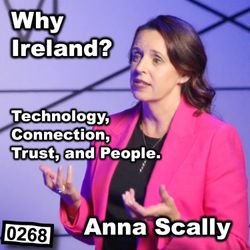
268. 0268 - Why Ireland? with Anna Scally
50:11||Season 13, Ep. 268Our guest for this session is Anna Scally - Partner and Head of Technology Media & Telecoms, KPMG in Ireland and EMA KPMG in Ireland. This is the third of 3 seminars organised by John Mooney as part of the Pepperdine Graziadio Business School MBA programme in collaboration with UCD’s MSc Digital Innovation programme.Anna gave a masterclass intro to corporate taxation in Ireland and its relationship with global trade (focus on technology companies). Yes, we need to talk about Trade, Tariffs, and Taxes, but the answers revolve around Technology, Connection, Trust, and People.Notes:Anna’s profile pages on KPMG.com (link) and LinkedIn (link)For more about the KPMG Global Tech Innovation competition 2025 (link)Washington National Tax (WNT); the KPMG think tank and technical core of KPMG’s U.S. tax practice. (link)Anna sits on the Advisory Board of Scale Ireland - https://www.scaleireland.com - Scale Ireland is Ireland’s leading independent not-for-profit, representative organisation for Irish tech start-up and scaling companies.IDA Ireland (the Ireland Development Authority) - http://idaireland.com - (Irish: An Ghníomhaireacht Forbartha Tionscail) is the agency responsible for the attraction and retention of inward foreign direct investment (FDI) into Ireland.Enterprise Ireland - https://www.enterprise-ireland.com/en/ - EI invests in and supports the development of Irish-owned companies “on their journey to achieving greater scale and to become global leaders in their field.” Revenue - Irish Tax and Customs – https://www.revenue.ie/ - The Tax Relief Scheme for Capital Expenditure on Intangible Assets (S. 291A) – (link)WTO landing page for learning about Tariffs –(link) AcknowledgementsMusic Title: First TakeArtist: Debajyoti Biswas and Michael O'NeillSource: mis.aup3License: CC BY-NC-SA 4.0Cover Art Title:(Screenshot from KPMG Platform – Global Tech Innovation 2024 launch event.)Artist: Allen HigginsSource: Pepperdine_AnnaScally.pptxLicense: CC BY-NC-SA 4.0Podcast LicenseDesign Talk (dot IE) CC BY-NC-SA 4.0 The license can be viewed at https://creativecommons.org/licenses/by-nc-sa/4.0By taking part, you give permission for your voice to be recorded, for the recording to be edited, and for it to be posted and published as a podcast.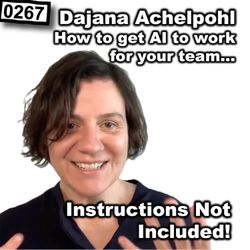
267. 0267 - Instructions Not Included with Dajana Achelpohl
49:11||Season 13, Ep. 267Our guest for this session is Dajana Achelpohl. Dajana heads up AI Change Maker and is an alum of Google & PayPal. The second of 3 seminars organised by John Mooney as part of the Pepperdine Graziadio Business School MBA programme in collaboration with UCD’s MSc Digital Innovation programme.Notes:AI Change Maker - https://www.aichangemaker.comDajana on LinkedIn - https://www.linkedin.com/in/dajana-achelpohl/On other media:Dajana Achelpohl’s talk with Audrey Chia “A Framework for AI-Ready Teams” (YouTube link)From AI Ireland: ‘Demystifying AI: Practical Applications and Business Integration’ with Google’s Dajana Achelpohl (link)AcknowledgementsMusic Title: First TakeArtist: Debajyoti Biswas and Michael O'NeillSource: mis.aup3License: CC BY-NC-SA 4.0Cover Art Title: Instructions Not Included! (screenshot from Dajana’s talk with Audrey Chia on YouTube)Artist: Allen HigginsSource: Pepperdine_Dajana.pptxLicense: CC BY-NC-SA 4.0 Podcast LicenseDesign Talk (dot IE) CC BY-NC-SA 4.0 The license can be viewed at https://creativecommons.org/licenses/by-nc-sa/4.0By taking part, you give permission for your voice to be recorded, for the recording to be edited, and for it to be posted and published as a podcast.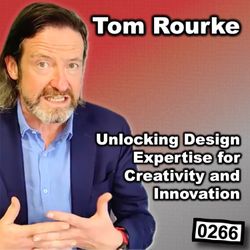
266. 0266 - Unlocking Design Expertise with Tom Rourke
52:33||Season 13, Ep. 266Our guest for this session is Tom Rourke. Tom works in Kyndryl as Vice President for Design, Insights and Innovation. The first of 3 seminars organised by John Mooney as part of the Pepperdine Graziadio Business School MBA programme in collaboration with UCD’s MSc Digital Innovation programme.Notes:Tom Rourke – LinkedIn profile: https://www.linkedin.com/in/tom-rourke-1a8b70/Tom gave a shoutout to Kevin Bethune - https://www.kevinbethune.comAlso, the MRI design story by Doug Dietz, Industrial Designer – (link)Also, Tom co-hosts The Progress Report, with Sarah B. Nelson (Chief Design Officer at Kyndryl) on:Apple Podcasts - https://podcasts.apple.com/ie/podcast/the-progress-report/id1627095388Spotify - https://open.spotify.com/show/23hDHHDkOPSeFrrNsa9jcD?si=fa531ad1ec36459bFinally, The Kyndryl Institute (download the app) - https://www.kyndryl.com/gb/en/institute/AcknowledgementsMusic Title: First TakeArtist: Debajyoti Biswas and Michael O'NeillSource: mis.aup3License: CC BY-NC-SA 4.0Cover Art Title: Unlocking Design (screenshot from Tom in Kyndryl leadership video)Artist: Allen HigginsSource: Pepperdine_Tom.pptxLicense: CC BY-NC-SA 4.0 Podcast LicenseDesign Talk (dot IE) CC BY-NC-SA 4.0 The license can be viewed at https://creativecommons.org/licenses/by-nc-sa/4.0By taking part you give permission for your voice to be recorded, for the recording to be edited, and for it to be posted and published as a podcast.
265. 0265 - Siobhain Duggan on Learning from Leaders
54:07||Season 13, Ep. 265Hosted by Brona RussellWe are delighted to have Siobhain Duggan, CEO of GS1 Ireland in to talk to the first year Economics & finance Organisation Behaviour class today. The interview/podcast is being hosted by UCD’s first year Economics and Finance class as part of the Professional and Academic Development module. Our focus is on the human aspects of organising in corporate settings, recognising the role of human behaviour in determining organisational effectiveness.Welcome Siobhain. So, it would be great to hear first about GS1 and what the work that you do. Then to understand your own career journey and how it has evolved over time: · Your readiness to take opportunities as they presented themselves. · Who were your mentors, and how did they help shape your career?And regarding your current role:· What motivated you to step up and to take on the CEO role in GS1?· What are some of the biggest challenges you have faced, and how did you persevere through them?· How has your leadership style evolved since you took on the role?· What do you maintain a healthy work-life balance juggling work and travel and family?And your thoughts in general on:· What are the most important qualities you look for in a future employee?· How important is diversity and inclusion to you as a CEO trying to encourage creativity and innovation?· How do you foster open communication and a positive work environment?· How do you foster a spirit of collaboration in your organisation?Before we finish, is there anything further you'd like to add?We’ll wrap it up there. Thank you so much for your time and for sharing your thoughts and experience with us today. Notes, extra questions, and further reading, books, blogs, pods, articles?Siobhain Duggan, CEO - GS1 Ireland - https://www.gs1ie.org/Siobhain on LinkedIn - https://www.linkedin.com/in/siobhainduggan/The UCD BSc Business and Economics programme (link)Article: Keeping track of the COVID-19 vaccine (HSE, 2022: link) AcknowledgementsMusic Title: ImpulseArtist: Ben PruntySource: https://www.benpruntymusic.com/License: Non-transferable license. Permission granted by Ben Prunty (personal letter) Cover Art Title: Pod-CoverArtist: Allen Higgins (photo used with permission)Source: Duggan_GS1.pptxLicense: CC BY-NC-SA 4.0 Podcast LicenseDesign Talk (dot IE) CC BY-NC-SA 4.0 The license can be viewed at https://creativecommons.org/licenses/by-nc-sa/4.0By taking part, you give permission for your voice to be recorded, for the recording to be edited, and for it to be posted and published as a podcast.